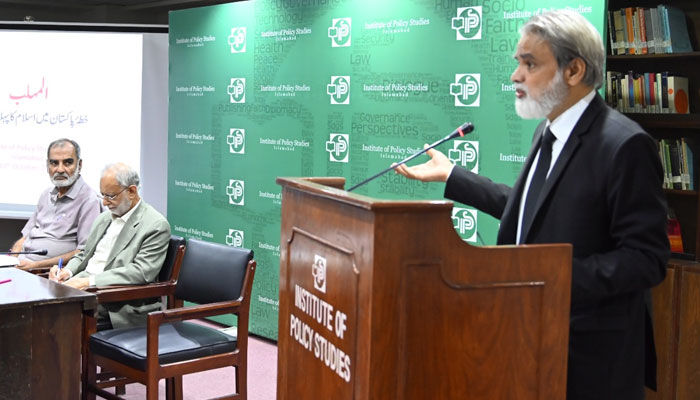Book reassesses Pakistan’s Islamic roots
Islamabad : Pakistan’s Islamic roots can be traced back to the arrival of Arab general Al-Muhallab ibn Abi Sufra in 664AD, almost five decades before Arab military commander Muhammad bin Qasim's conquest of Sindh in 711AD, according to a new book.
Al-Muhallab not only expanded the Islamic frontier but also played a pivotal role in shaping the cultural and religious landscape of present-day Pakistan, noted Dr Syed Mohammad Anwer, aalim judge, Federal Shariat Court, at the launch of his latest book, "Al Muhallab – Khita e Pakistan Main Islam Ka Pehla Alambardar" (The first standard-bearer of Islam in the region of Pakistan) at the Institute of Policy Studies here.
Dr Anwer highlighted Al-Muhallab’s exceptional leadership, his military acumen, and his significant victories, saying all that shows his use of non-kinetic warfare strategies, including diplomacy and conflict resolution, which hold significant relevance in modern discussions of warfare and fifth-generation warfare tactics.
He said Al-Muhallab’s victories were not just military triumphs but also marked the introduction of a new ideological and cultural wave in the region.
The author said the civilisational encounter between Islam and South Asian region did not happen in isolation; rather, it was part of a parallel process of “Islamisation of India and Indianisation of Islam” that continued through centuries.
Intellectual Prof Jalil Aali opined that when a religion entered a new region, it went through a civilisational process, shaping the norms and also being shaped by the local culture.
Gallup Pakistan founder Dr Ijaz Shafi Gilani said history was any region's first identity.
He said a long-term understanding of Islamic history in Pakistan should not be reduced to a few events and figures as Pakistan had a rich Islamic heritage.
"Readers should recognise the many layers of influence that shape the region long before the era of Muhammad bin Qasim," he said.
Senior research fellow at IPS Dr Shahzad Iqbal Sham said the book opened the door to a deeper understanding of the pre-Qasim period of Islamic history in Pakistan, suggesting that the story of Islam in the subcontinent is far more complex and diverse than traditionally thought.
"The book and the discussion around it reflect a larger movement toward reassessing the historical narrative of the subcontinent, encouraging scholars and the public alike to explore figures and events that have been marginalised in history," he said.
-
 Demi Lovato Leaves Fans Disappointed With Unexpected Announcement
Demi Lovato Leaves Fans Disappointed With Unexpected Announcement -
 Pacers Vs Knicks Overtime Thriller Ends In Heartbreak For New York
Pacers Vs Knicks Overtime Thriller Ends In Heartbreak For New York -
 Who Owns The Ambassador Bridge? New Report Links Owner Matthew Moroun To Trump’s Threat
Who Owns The Ambassador Bridge? New Report Links Owner Matthew Moroun To Trump’s Threat -
 ICE Detention Center Plan Sparks Controversy In Maryland As Lawmakers Push Back
ICE Detention Center Plan Sparks Controversy In Maryland As Lawmakers Push Back -
 Blood Pressure Medication Recalled After Wrong Tablets Found In Bottles
Blood Pressure Medication Recalled After Wrong Tablets Found In Bottles -
 Why Ariana Grande Wants A 'tiny Mouse' To Play Her In Biopic?
Why Ariana Grande Wants A 'tiny Mouse' To Play Her In Biopic? -
 Wind Chill Returns With Brutal Cold As Polar Vortex Stalls Over Canada
Wind Chill Returns With Brutal Cold As Polar Vortex Stalls Over Canada -
 Princess Beatrice, Eugenie ‘do Not Want To Be Seen In Public’ Because Of Dad
Princess Beatrice, Eugenie ‘do Not Want To Be Seen In Public’ Because Of Dad -
 Costco $20 Rule Explained As Employee Pay Climbs Across North America
Costco $20 Rule Explained As Employee Pay Climbs Across North America -
 Strange Incident Happened At Nancy Guthrie's Home On Abduction's 10th Day
Strange Incident Happened At Nancy Guthrie's Home On Abduction's 10th Day -
 Tumbler Ridge School Lockdown Underway As RCMP Investigate School Shooting
Tumbler Ridge School Lockdown Underway As RCMP Investigate School Shooting -
 Royal Family Knows There Can Be ‘no More Glossing’ Of Andrew Downfall
Royal Family Knows There Can Be ‘no More Glossing’ Of Andrew Downfall -
 Britney Spears Quietly Parts Ways With Her Music Catalog: Report
Britney Spears Quietly Parts Ways With Her Music Catalog: Report -
 Princess Diana Bodyguard Suspected ‘she Could Die’: Here’s How
Princess Diana Bodyguard Suspected ‘she Could Die’: Here’s How -
 Teddi Mellencamp Marks Huge Milestone With Emotional Message Amid Cancer
Teddi Mellencamp Marks Huge Milestone With Emotional Message Amid Cancer -
 Shamed Andrew To ‘kiss And Tell’ After Dip In Popularity
Shamed Andrew To ‘kiss And Tell’ After Dip In Popularity




